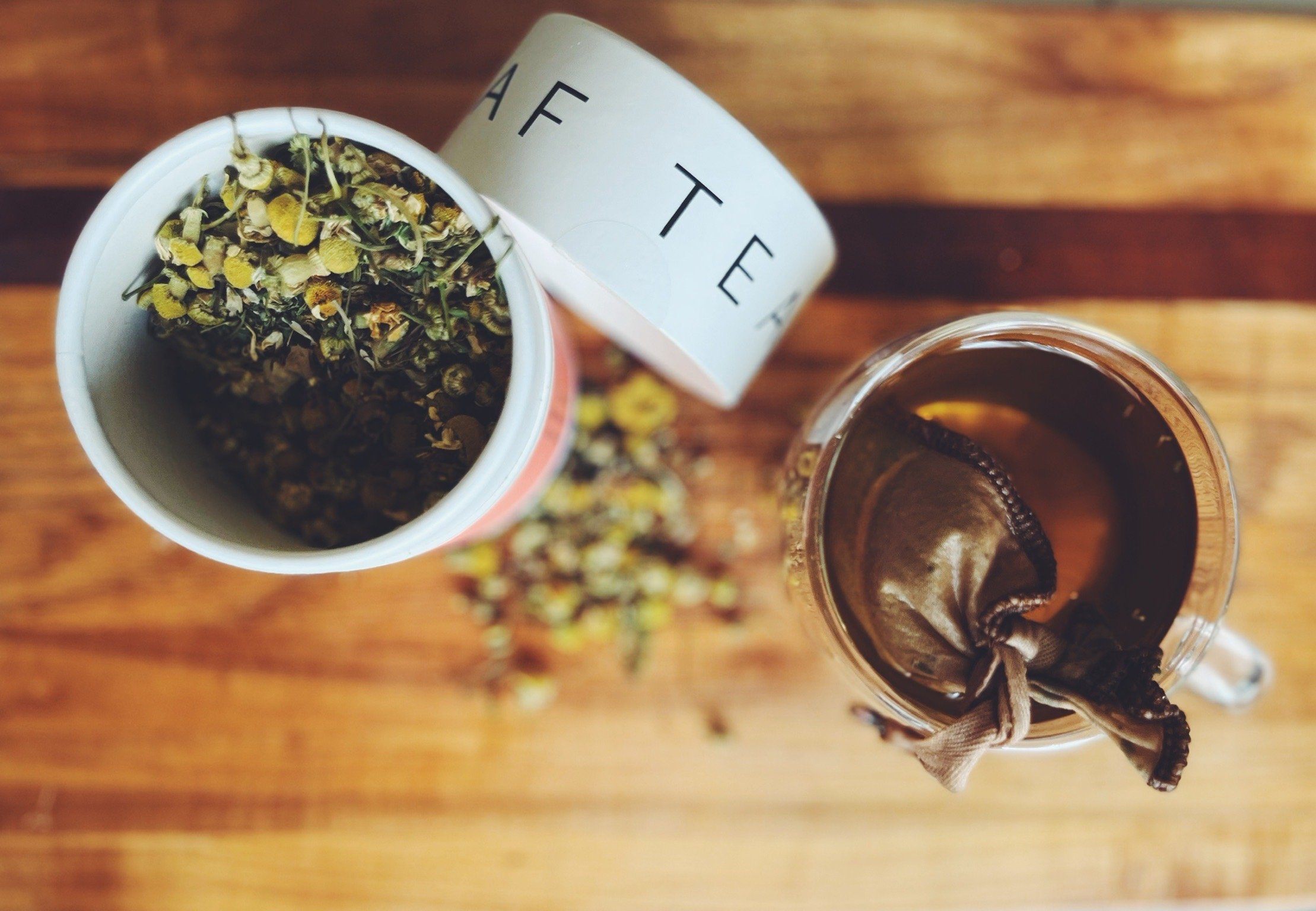DIY Tea Blends for Cold & Flu Season
Blend a batch of tea to keep the sniffles at bay.
It happens every winter on this side of the planet—the chill sets in, the rains and snows come, and we trade in our picnics for indoor game nights and holiday parties. And as we gather inside, the first shared sniffles start making the rounds.
With any luck, you’ll have a sneeze or two and pass through the season change unscathed. But more and more these days it seems that most of us will wake up one morning with a bit more than a stuffy nose and scratchy throat.
It’s not inevitable though. You have a whole immune-boosting toolkit right in the aisles of your grocery store. The humble homemade herbal tea offers more than warmth and comfort, it can be packed with immune-boosting properties and natural remedies in the fight against the seasonal viruses that make winter a bit less jolly.
Of course, we think you should head to your doc to get your boosters if you haven’t already. Then head to the produce aisle to stock up on tea ingredients.
The immune-boosting power of herbs
Herbal teas, brewed from dried plants, contain a rich blend of antioxidants, vitamins, and minerals that can significantly enhance your immune system's resilience. And yes, you could buy a pre-packed immune-boosting tea, but when you make it yourself, your herbal mix is typically fresher, retaining a higher concentration of active ingredients. Plus, you’ll make a blend suited to your personal tastes and the symptoms you tend to experience.
Drink your tea daily, and you’ll bolster your body's defenses and increase your ability to fend off common cold and flu viruses.
Herbs to Combat Cold and Flu Symptoms
Most natural ingredients contain antioxidants and medicinal properties. The ones listed below have been used for centuries to ward off sickness and ease the symptoms most typically associated with seasonal viruses.
Ingredients you can buy in the produce section:
Citrus: High in vitamin C, citrus juice and peel can help keep viruses at bay and reduce the severity of colds and flus if you do get sick. Vitamin C fights phlegm and strengthens the immune system. Add lemon or orange juice to your teas or steep the peels in your brew.
Ginger: Known for its anti-inflammatory and soothing properties, ginger is a staple in many homemade teas, helping to relieve congestion, ease nausea, and soothe a sore throat.
Peppermint: With its refreshing taste and decongestant properties, peppermint helps combat cold and flu symptoms, clear sinuses, reduce headaches and relieve respiratory discomfort, promoting a quicker recovery from illness.
Cinnamon: Cinnamon is known for its antimicrobial and antiviral properties. It can help fight off both bacterial and viral infections.
Thyme: Thyme contains compounds like thymol and carvacrol, which possess antimicrobial properties. Thyme tea can help relieve respiratory issues such as coughs and sore throats.
Lemongrass: Lemongrass has antibacterial and antifungal properties that can help prevent and treat infections. It also has a soothing effect on the respiratory system, making it beneficial for alleviating coughs and other cold and flu symptoms.
Honey: While not technically a produce item, raw honey is often found in the same section. It has antimicrobial and soothing properties that can help alleviate sore throat and cough symptoms. It also contains antioxidants that support overall immune health, and it tastes great, adding that hint of sweetness to your tea.
Head to the natural foods shop for these herbal extras:
Elderberry: Renowned for its potent antiviral properties, elderberry has long been used to alleviate symptoms associated with colds and flus. Rich in antioxidants and vitamins, elderberry tea can help reduce the severity and duration of flu symptoms, including fever, cough, and body aches.
Echinacea: Widely recognized for its immune-boosting effects, echinacea can be brewed into a tea that not only fortifies the body's defenses but also aids in alleviating symptoms such as sore throat, congestion, and fatigue.
Lemon Balm: Known for its calming and antiviral properties, lemon balm can help alleviate fever, headaches, and muscle pains commonly associated with the flu. Its soothing effects can also promote relaxation and improve sleep quality, essential for a swift recovery.
Ginseng: Ginseng is an adaptogenic herb known for its ability to modulate the immune system. Drink it regularly to help enhance your body's resistance to infections and reduce the severity of cold and flu symptoms.
Chamomile: Chamomile is known for its calming and anti-inflammatory properties. It can help reduce stress and promote relaxation, which is crucial for supporting the immune system during periods of heightened susceptibility to colds and flus.
How to add homemade herb teas into your routine
Here’s the good news: Once you’ve gathered your preferred ingredients, it’s as simple as a bit of light chopping and boiling some water to make a homemade herbal tea.
Select as few or as many of the ingredients as you want and prep the larger pieces by chopping them down to the size that will fit inside a tea bag. For ingredients that are fresh and not dried, try using the back of a spoon to lightly smash the stems and leaves to release some of the oils.
For citrus, peel small sections and juice the fruit. For dried ingredients, aim for ⅛ to ¼ tsp per cup of tea, alongside your fresh ingredients.
Add 2-4 cups of water to a small pot, toss enough tea ingredients into a tea bag to fill about half the bag loosely per cup of tea, and bring to a boil for about 5 minutes. Add a touch of honey and taste. Adjust any of the ingredients or steep time to get the strength and flavor you like.
This is not an exact science. Experiment to get the experience you’re looking for. Have fun, and stay healthy!
